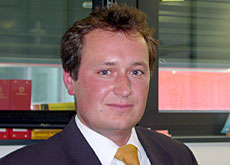Switzerland hails signing of Europol accord

Switzerland says it has strengthened its crime-fighting arsenal by signing a cooperation agreement with the European Union’s criminal intelligence agency, Europol.
In an interview with swissinfo, Marco Gamma, the Federal Police Office’s Europol adviser, says both parties stand to benefit from the deal.
The accord was signed in Bern on Friday by Jean-Luc Vez, director of the Federal Police Office, and Mariano Simancas, interim director of Europol.
Speaking at the ceremony, Simancas said he “welcomed Switzerland into the security club”.
Under the agreement, Switzerland will be able to tap into Europol’s intelligence files on organised crime, drug trafficking and terrorism.
As a non-EU member country, Bern has not been granted full access and will only be able to apply for information on a case-by-case basis.
But Gamma insists the agreement, which still has to be ratified by the Swiss parliament, is an important step forward for Switzerland in the fight against crime.
swissinfo: Switzerland has concerns about terrorism, drug trafficking, cigarette smuggling and money laundering. How will the agreement help in the fight against these sorts of crimes?
Marco Gamma: Firstly, investigations of organised crime and terrorism are very complicated. They are time-consuming and they need a lot of personnel resources. You need special investigative tools and, of course, you need reliable information and good analytical work.
Thanks to this cooperation agreement, we will be able to share information, analysis, expertise and training methods, so this is a major step forward.
swissinfo: So, it is a serious addition to Switzerland’s crime-fighting capability.
M.G.: Of course. It’s the first time we have entered into police cooperation with the EU with regard to organised crime and terrorism. These are things that Switzerland is affected by – as are other countries in Europe.
swissinfo: Has Switzerland’s fight against crime – especially in terms of counter-terrorism – been hampered by being outside Europol?
M.G.: No. I would say “hampered” is definitely the wrong word. We still have our existing pillars – the global network with Interpol and the bilateral network with other countries – so information exchanges have been possible.
But, of course, we have not been able to benefit from the analytical work that is done in the field of counter-terrorism by Europol, and the cooperation agreement will fill this gap.
swissinfo: Switzerland will have access to Europol’s files, but the agreement does not include access to the EU’s Schengen Information System on cross-border crime. Is this a problem?
M.G.: Europol and Schengen are really two different but complementary tools in the fight against international crime. Europol is basically criminal analysis and the exchange of information, whereas Schengen’s core function is to provide warrants for wanted or missing persons or objects. Switzerland is trying to move forward to have both cooperation with Europol and the association with Schengen.
swissinfo: A Swiss police officer will be sent to The Hague. What will his or her role be?
M.G.: We plan to send at least one liaison officer to The Hague. His task is to work as a door-opener for Switzerland. That means his role will be to support and coordinate the cooperation between Switzerland and other EU countries.
swissinfo: Switzerland is getting access to Europol at the same time as new EU member countries are joining and widening the agency’s intelligence network. Would you say you are signing up at a good time?
M.G.: Definitely. Having contact via Europol with 15 or with 25 members is a big step forward, especially considering the fact that these new countries come from central and eastern Europe, and this area is linked with a lot of crime.
swissinfo: Europol has been in operation for six years. How effective do you think it has been during that time?
M.G.: It’s quite a young organisation but it’s becoming more and more effective. The number of cases dealt with last year was much higher than it was the year before. For Europol to be effective, I think it has to have the information it needs for its analytical work. This information exchange is improving day by day and year by year.
swissinfo: We have been talking about what Europol can do for Switzerland, but what can Switzerland bring to Europol?
M.G.: Firstly, Europol needs information and we can provide Europol with the information it needs for its analytical work. So, here a gap can be filled.
Secondly, Switzerland has a lot of experience, for example in the field of fighting money laundering and terrorist financing. This is knowledge we can bring to Europol.
swissinfo-interview: Adam Beaumont
Europol dealt with 4,700 cases in 2003.
This was almost 40% up on the previous year.
Seven of the ten new EU countries became full members of Europol earlier this month.
Malta, Poland and Estonia are expected to join by the end of the year.

In compliance with the JTI standards
More: SWI swissinfo.ch certified by the Journalism Trust Initiative

You can find an overview of ongoing debates with our journalists here. Please join us!
If you want to start a conversation about a topic raised in this article or want to report factual errors, email us at english@swissinfo.ch.